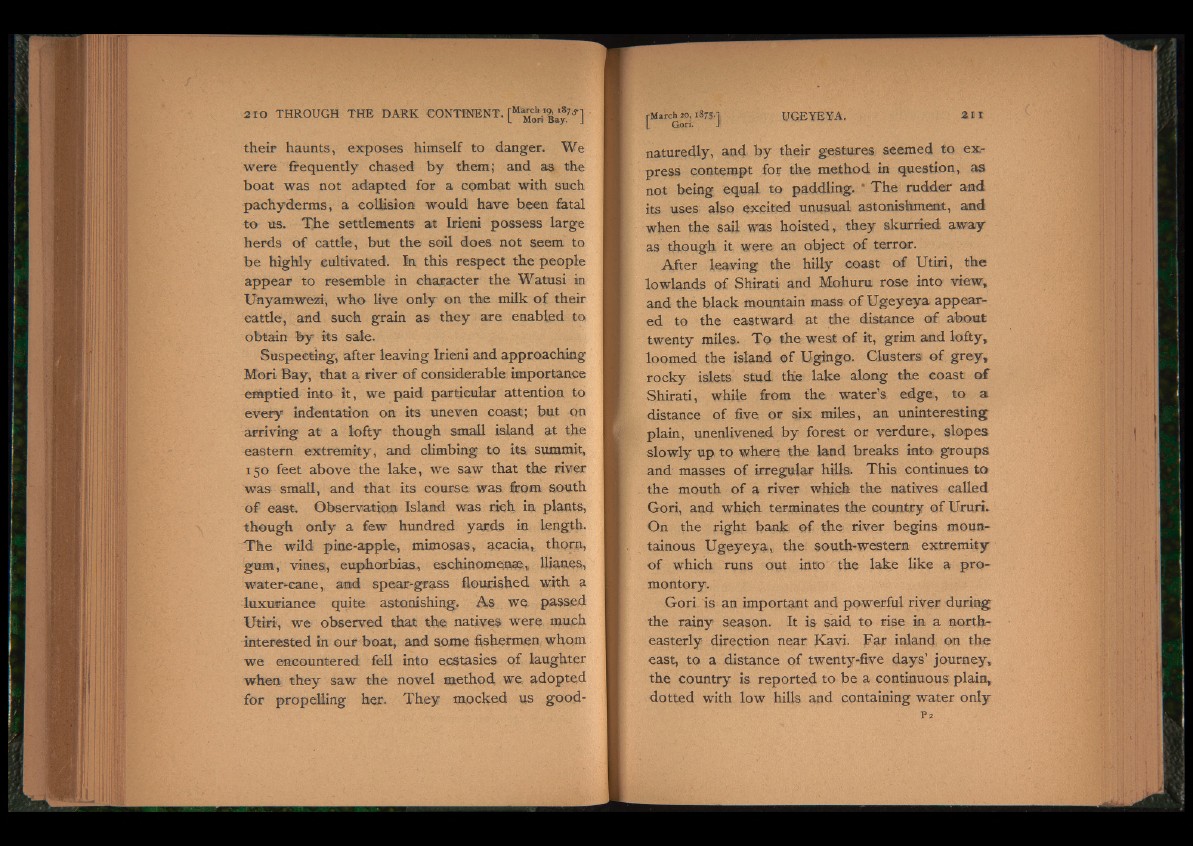
their haunts, exposes himself to danger. We
were frequently chased b y them; and as the
boat was not adapted for a combat with such
pachyderms, a collision would have been fatal
to us. T h e settlements at Mem possess large
herds o f cattle, but the soil does not seem to
b e highly cultivated. In, this respect the people
appear to resemble in character the Watusi in
Unyamwezi, who live only on the milk o f their
cattle, and such grain as they are enabled to
obtain fey its sale.
Suspecting, after leaving Irieni and approaching
Mori Bay, that a river o f considerable importance
emptied into it, we paid particular attention to
e v e ry indentation on its uneven coast; but on
arriving at a lo fty though small island at the
eastern extremity, and climbing to its summit,
150 feet above the lake , w e saw that the river
wa s small, and that its course was, firom south
o f east. Observation Island was rich in plants,
though only a few hundred yards in length-
T h e wild pine-apple, mimosas» acacia» thorn,
gum, vines, euphorbias^ e.schinomenae, llianes,
water-can e , and spear-grass flourished with a
luxuriance quite astonishing. A s w e passed
Utiri, we observed that the natives were much
interested in our boat, and some fishermen whom
w e encountered fell into ecstasies o f laughter
when th e y saw the novel method we, adopted
for propelling her. T h e y mocked us good-
March 20, 1875.'
Gori.
naturedly, and b y their gestures seemed to e x press
contempt for the method in question, as
not being equal to paddling. * The rudder and
its uses also excited unusual astonishment, and
when the sail was hoisted» they skurried aw a y
as though it were an object o f terror.
A fter leaving the hilly coast o f Utiri, the
lowlands o f Shirati and Mohuru rose into view,
and the black mountain mass o f U g e y e y a appeared
to the eastward at the distance erf about
twenty miles- T o the west o f it, grkn and lo fty,
loomed the island o f Ugingo. Clusters o f g r e y ,
ro ck y islets stud the lake along the coast o f
Shirati, while from the water’s edg e , to a
distance of five or s ix miles, an uninteresting
plain, unenlivened b y forest or verdure, s lop e s
s low ly up to where the land breaks into groups
and masses o f irregular hills. This continues to
the mouth o f a river which the natives called
Gori, and which terminates the country o f Ururi.
On the right bank o f the river begins mountainous
U g e y e y a , the south-western extremity
o f which runs out into the lake like a promontory.
Gori is an important and powerful river during
the rainy season. It is said to rise in a northeasterly
direction near Kavi. Far inland on the
east, to a distance o f twenty-five d ay s’ journey,
the country is reported to be a continuous plain,
dotted with low hills and containing water on ly